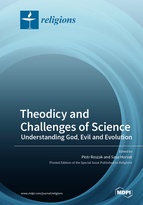Theodicy and Challenges of Science: Understanding God, Evil and Evolution
A special issue of Religions (ISSN 2077-1444). This special issue belongs to the section "Religions and Theologies".
Deadline for manuscript submissions: closed (31 August 2021) | Viewed by 41679
Special Issue Editors
Interests: theology of science; theodicy; science–religion debate; Thomism; pilgrimage; medieval liturgy; philosophy of religion; religious freedom
Special Issues, Collections and Topics in MDPI journals
Interests: philosophy of science; philosophy of religion; neurophilosophy; philosophical anthropology; cognitive science of religion; ontology; theodicy
Special Issue Information
Dear Colleagues,
The aim of the Special Issue is to address one of the most challenging questions in theodicy: if God is infinitely good, how can there be so much pain and suffering in the evolutionary path of the human beings? Or more specific, if God exists, why did He allow evolution to develop cognitive mechanisms that produce behaviour that is evil or morally bad, causing pain and suffering to so many? Contributions aiming to rethink the interconnectedness of the fundamental concepts such as evolution, nature, suffering, pain, values, evil, and good, would be welcomed. Very often, “nature red in tooth and claw” is raised as an argument against the existence of God. However, can we consider the nature and evolution from a broader perspective, providing a new framework for understanding pain and suffering? This Special Issue also welcomes contributions regarding the (evolutionary) cognitive science of religion, which is developing serious challenges to theodicy and understanding the God–world relation. Namely, the evolved moral bias of the in-group against the out-group for the goal of survival is considered one of the key factors for enabling the prejudice and dehumanization that causes harm and violence. Nevertheless, the same biological fundaments and cognitive mechanisms also enabled moral codes of religion that proclaim good moral behaviour, such as altruism, cooperation and sentience. How can we incorporate these theories into theodicy and provide new perspectives on the issue? Contributors are encouraged not to rely exclusively on philosophical and theological theories, but to be open for scientific insights that suggest reconsideration of the classical viewpoints in theodicy.
Prof. Dr. Piotr Roszak
Dr. Sasa Horvat
Guest Editors
Manuscript Submission Information
Manuscripts should be submitted online at www.mdpi.com by registering and logging in to this website. Once you are registered, click here to go to the submission form. Manuscripts can be submitted until the deadline. All submissions that pass pre-check are peer-reviewed. Accepted papers will be published continuously in the journal (as soon as accepted) and will be listed together on the special issue website. Research articles, review articles as well as short communications are invited. For planned papers, a title and short abstract (about 100 words) can be sent to the Editorial Office for announcement on this website.
Submitted manuscripts should not have been published previously, nor be under consideration for publication elsewhere (except conference proceedings papers). All manuscripts are thoroughly refereed through a double-blind peer-review process. A guide for authors and other relevant information for submission of manuscripts is available on the Instructions for Authors page. Religions is an international peer-reviewed open access monthly journal published by MDPI.
Please visit the Instructions for Authors page before submitting a manuscript. The Article Processing Charge (APC) for publication in this open access journal is 1800 CHF (Swiss Francs). Submitted papers should be well formatted and use good English. Authors may use MDPI's English editing service prior to publication or during author revisions.
Keywords
- theodicy
- evolution
- cognitive science of religion
- freedom
- providence







